- Home
- Rose Tremain
The Darkness of Wallis Simpson Page 13
The Darkness of Wallis Simpson Read online
Page 13
He felt himself sinking into perpetual misery. Even his walks with Jeff took on a sad aspect. His love for this dog now struck him as a tragic thing.
So he sat down and wrote to Marie. He had no idea if her old address in Swallowfield would find her. He asked her to come to London and meet him for dinner at a hotel of her choice. And after three or four weeks, a reply turned up. He recognised her writing on the envelope straight away. A few things about a person never change, he observed, and handwriting is one of those few.
A night and a day passed.
Frank was now sitting in the hotel lounge, where a harpist played. A waiter brought him the tea and sandwiches that he’d ordered, but he didn’t really want any of this. He felt nervous, slightly sick. Just over three hours remained before his meeting with Marie and, to his mild surprise, this meeting was suddenly taking on the aspect of an ordeal. Frank sat and counted the cost of the plane ticket, the cabs, the hotel, the drinks and meals. He thought of Jeff lying on the porch and waiting for his master and whining as the night came down.
Why had he arranged the trip at all? Only to hear confirmed the sorry truth that his English fiancée had sailed to America, taken one look at him and sailed back. But why in the world had he assumed Marie would ever admit to this? She was a woman of sixty-three. She would have learned some skill with people’s feelings by now. He could already hear her saying: ‘No, no, Frank. You’ve got that completely wrong. I just . . . in the end . . . couldn’t leave England, that was all. I never got on the ship.’
And then they would eat their expensive dinner and talk of other things. Other things of no importance. And after that, after a liqueur, a green liqueur, say, she would leave. He would watch her go, a middle-aged Englishwoman getting thick around the waist, her chestnut hair gone grey, a person who had been afraid to leave the shelter of her village, for whom the idea of America had been too challenging and pitiless and bright.
‘God dammit to hell!’ Frank said aloud and some of the other people taking tea turned round to stare at him, and even the harpist looked up at him over the strings of her harp as he threw his linen napkin down and strode out of the room.
Just after eight o’clock, the phone in Frank’s room began its summons. He knew he had only to pick it up to hear a voice announce to him that a Miss Marie Smythe was waiting for him in the lobby downstairs. But he let it ring.
It rang three more times, at five-minute intervals. And then everything went quiet again.
He felt peaceful, lying on the hotel bed, more peaceful than he’d felt in a long time. He poured himself a whisky from the minibar.
London, England, flickered and rumbled and churned outside his window, but he had no interest in it. None. Let it go its unfathomable way. Why should any American care about one single thing in it? Why should any American in his right mind ever have cared?
As he drank the good whisky, Frank Baines began wondering how long he had left to live. Five years? Ten? He hoped it might be ten. He hoped, when the dog died, there’d be time for one more pet and that, in the scented Sweetwater evening, Barbara would say: ‘I suppose we’re going to call him Jeff once again, are we, Frank?’
And Frank would say no.
Moth
I was her new neighbour on the Sunny Lawns Trailer Park, that’s all. The park was a mile or two out of Knoxville in some nice country, with a lake and a cluster of live oaks.
Everybody called her Pete. I dunno what name she got at her baptism. That’s her secret. She was Pete to us all. Nobody said OK, but what’s your real name?
She was on her own with two kids, a girl and then a boy who was just a baby. The thing she loved to do was called appliqué. She’d learned it from some sewing magazine. You cut up shapes of fabric, preferably shiny, and you machine them on to things, to make patterns. That’s appliqué. If you get tired of making patterns, you can make pictures – like a girl in a bonnet, or a bluebird.
Day and night, night and day Pete sat in her trailer doing her appliqué. Her sewing machine got so hot it wouldn’t let itself be touched. She made laundry bags and cushion covers and aprons, and sold them up in the Smoky Mountains somewhere, in a craft village. There was a flaked-out hippie in that village who had a thing for her. He made rustic fencing and his hair was grey as a waterfall. Pete and he lay on the floor of his cabin, lit by oil lamps, but she wouldn’t let him do it to her. When I imagine this scene, I put a poster of Yoko Ono on the wall above, wearing her dark glasses.
The father of the kids used to work for the Fire Service. Still does, I guess. You could dial 911 in Knoxville and still get him to fight your fire. His name was Chester and he had an appetite so big, he used to snatch food off Pete’s plate and stick it in his own mouth. He weighed down the trailer. And his shit wouldn’t flush away, it was that huge. Apparently. Pete would have to take a hoe and break it up like you break up the dirt of the yard after the winter frost.
Yet I guess she loved him. That’s one of the odd things about it all. She loved Chester and never minded breaking up his shit with a hoe or letting him grab the bacon off her plate. But then he left her for a girl of twenty-two and this she did mind. That’s when she took up the appliqué. If I’d been her, I would have imagined I was sewing Chester’s foreskin on to his face, stitching up all his lying orifices, but I don’t know what her reason was precisely. All she said about it was: ‘Annie, never again will I put my trust in one single thing.’
Her little girl, Lisa, was five and as good as apple pie. She came to visit me and we’d make popcorn and Lisa’d hold tight to the long-handled pan and say, ‘Wow!’ She had a whispery laugh, like the wind in the grasses at the edge of the lake, and her favourite singer was Mary Chapin Carpenter.
She never mentioned her daddy. I guess Pete told her not to think about him any more, because he didn’t seem to figure in her mind at all. Whenever she slept over at my trailer – when Pete went to sell her appliqué and get herself fondled by the mountain hippie – Lisa would say her prayers and leave the cheatin’ ole firefighter out of them completely: God bless Mom and Baby Ricky and All the Poor People everywhere, Amen.
And then she’d sing herself to sleep with the words of Country songs. Her little thin arms would wave around in the cot, in time to the beat, and then suddenly she’d go quiet and never wake till morning. She was the only human being I’ve ever met who could go to sleep with her arms sticking straight up in the air. Sometimes, I’d lay them down by her sides, or sometimes I’d just leave them the way they were.
Baby Ricky was different from Lisa from the start. Pete told me when he was born he weighed so heavy the scales emitted a bleep, like a warning. He was Chester’s boy. Pete tried to suckle him as she’d suckled Lisa, but she told me: ‘I couldn’t go on with it, Annie, Ricky’d pull at the nipple so hard. So I weaned him and put him on a full bottle. He’d fill his diapers and as soon as I’d changed him he’d yell out for more, dammit, and some days I had to feed him twenty times in twenty-four hours and all I had of sleep was a few minutes here and there.’
She got him on solid food and he quietened down. That’s when Chester left – in one of those quiet times when Baby Ricky was full of food and lying in his pram, staring at the ceiling of his trailer home, and Pete was dead asleep. Who knows if he looked at Baby Ricky one last time and said ‘see ya, kid’, or if he was just in such a sweat to get out of there that he never gave his son a glance? It makes no difference. It’s just a habit I have, trying to imagine the details of things, like I put in that Yoko Ono poster in the hippie’s cabin. Anyways, Chester was gone, leaving Pete with those two kids, Lisa and Baby Ricky, and her sewing machine. And it was soon after that I moved into the trailer next door to them and Pete and I became friends.
I was on my own. I worked in a dry-cleaners called Secco’s where all the bagged-up clean stuff on its hangers got rotated round the back room on a moving rail and all the employees got rotated round the different machines, to keep them alert.
S
ome days, I stood in the back window, operating the presser and watching the Tennessee spring bust out of the redbud trees and out of the earth. A lot of the clothes I pressed had moth holes or scorch marks in them and weren’t worth cleaning. I daydreamed I’d write a book before I was forty. I guess the heat from the presser and the scent from the frothy redbuds mingled together to give me this grand illusion, because now my fortieth has come and gone and there’s no sign of my book, only this true story of Pete and Lisa and Baby Ricky. So I’m going to put this all down. Everything happened real fast, but in a way it was long and complicated, like a book can be.
I guess Ricky was about nine or ten months old when Pete said to me: ‘Annie, there’s something wrong when I lay Ricky down because he kicks and screams like he’s in pain, but I don’t know why.’
I said to take him to the doctor’s, Pete, but she said no, she wouldn’t yet, she hated going there and waiting in line and breathing the germ-filled air, and anyway doctors these days didn’t know shit. I had to agree with her there.
So I helped her to examine Ricky. We put him on a blanket and undressed him and held him up and looked at him, limb by limb. He reminded me of a sumo wrestler. He wouldn’t keep still. He wanted to be on his knees, crawling around among the scraps of satin under the appliqué table. His body felt hot and there was a glisten of sweat in the fold of his neck, but his eyes were bright as tin and his skin was rosy and there was no bruise or scratch on him. But then we tried to lay him on his back and when his shoulders touched the floor he screamed so loud Lisa came running in from the dusty yard and stood in the doorway watching.
Pete picked him up and, real gently, trying to make my hands as soft as gloves, I touched his back and then I said to Pete: ‘I can feel something here, Pete, where his shoulder blades are, I can feel two lumps there.’
‘Jesus Christ!’ said Pete. ‘Lumps? Where?’
I showed her and she pressed them with her fingers and Ricky screamed.
‘Couldn’t be cancer,’ said Pete. ‘One on either side like that. Couldn’t be, could it?’
‘No,’ I said.
‘Guess I’d better take him by the doctor, had I?’
‘Or you could wait. See if they just go.’
‘Yeah. They could go. Could be the way he keeps trying to pull himself up with his arms, like it’s made his muscles swell, could it?’
‘Dunno,’ I said. ‘I never studied anatomy.’
Then one night I was lying asleep after my long day at Secco’s when Pete came thumping on my trailer door.
‘Annie,’ she said, ‘come quick. Ricky’s on the ceiling.’
I said what did she mean ‘on the ceiling’ and she said come see.
I got into my dressing gown and followed Pete into the room where the two kids slept. Lisa was awake and sitting on her bed, staring up. And just as Pete had said, there was Ricky, wearing a diaper but nothing else, looking down on us from on high. It was like he was full of helium and had floated up there like a balloon. He wasn’t holding on to anything and he wasn’t one bit afraid. He was gurgling with happiness and little gobs of his spittle plopped down on to our heads, like rain. It was the weirdest thing I’d seen in thirty-nine years of living.
Lisa said: ‘I want to go up on the ceiling too!’
So I said: ‘Sweetheart, hold on a minute, because we don’t know how Ricky got there and the ceiling ain’t that good a place to be.’
Pete said: ‘Annie, since Chester left, I jes’ dunno what in the world is goin’ on.’
And I said: ‘Well, Pete, maybe Ricky’s practising being a firefighter, spittin’ on us, like that,’ but no one laughed.
Then I got a chair and climbed up on to the old teak wardrobe where the kids kept their things. I didn’t feel that safe up there. I felt too heavy for the furniture. I wasn’t far from where Ricky was, so I steadied myself and reached for him, but no sooner had my hand touched him than he spun away from me, going in a zigzag towards the light fixture.
‘Jesus Christ!’ said Pete.
‘Ricky’s flying!’ said Lisa.
And we could hear a miniature sound as he moved, a kind of whirring, like from a portable plastic fan you can buy to keep your face cool on a June day.
We had to move the wardrobe three times before I could get Ricky, because he didn’t want to be got. He wanted to go on zooming around up there out of everyone’s reach. But I caught him in the end and handed him down to Pete, and he began screaming louder than we’d ever heard him scream before. He tried to struggle out of Pete’s arms, but Pete held on to him and wouldn’t let him go and that’s when she started swearing Jesus Christ Jesus Christ and went real pale, and Lisa stuck her thumb into her mouth, and I climbed down and knelt by the side of them.
Growing out of Ricky’s shoulder blades in the place where I’d found the lumps was a pair of wings. They were the colour of Ricky’s pink flesh and there was blood on them and they were bedraggled and small, but they were wings all right, and after a long struggle with Pete, Ricky got them palpitating fast like the wings of a hummingbird and he flew out of the bedroom door into the bright, watery light of the kitchen.
I said to Pete: ‘We oughta let someone look at these wings, like a surgeon for example.’
But Pete said: ‘No way! We’re keeping them hid and pray they drop off.’
Then a few days later I said: ‘Listen, Pete, you know this is a phenomenon unique in the world – the flying baby! All you gotta do is advertise and charge for entry and let Ricky fly around the trailer park, and in one month you’ll be a billionaire.’
This got her thinking. Instead of keeping Ricky’s wings folded away all the time inside his clothes, she let him use them to fly round the trailer. He liked to hover near the ceiling and he got dirty from all the dust and grease up there, but you could tell he was happy. Except he was lousy at landings. He had to fall down and roll over like a parachutist and this crushed his wings every time and there seemed to be no way to soothe the pain that he felt. We tried putting wych-hazel on his feathers, but it didn’t do anything and soon after Pete said to me: ‘Annie, for nine-tenths of his life that child’s in mortal agony.’
Pete was still considering becoming a billionaire with my flying baby idea, but she said she was going off it because really she couldn’t believe – after what happened with Chester – that any human plan could turn out right. She said: ‘Annie, why can’t everything just be safe and ordinary like it was before?’
I said: ‘Pete, this is one crazy time we’re alive in. When was anything safe and when was it ordinary?’
Pete said: ‘I guess you’re right. It never really was.’
We were in Kroger’s supermarket in Knoxville when we had this conversation, with Ricky in our shopping cart and Lisa trailing along with a little carton of mango juice.
Pete and I were examining the thirteen different kinds of salad leaves you could buy at Kroger’s, looking at all their names like arugula and radicchio and lollo rosso that never used to be part of life on earth. We were so caught up with the arugula that we forgot about Ricky for one entire minute and when we looked round at him, he’d tugged off his T-shirt and was pulling himself up, and before we could grab ahold of him he’d started his hummingbird thing and lifted off above the vegetable display. He hovered there for a moment, then went flying away down the supermarket aisles.
We just stood there. We couldn’t think what else to do. And we saw all the shoppers struck dumb one by one and stand real still, gawping and pointing. In his usual way, Ricky had gone up to the ceiling which, in Kroger’s, was chequered with big panels of light. And I shall never as long as I live forget the sight of him crossing these light panels and casting sudden little shadows across the store. I know a lot of people in Kroger’s that day just didn’t believe what they were seeing. They thought Ricky was an electric baby, operated by remote control.
We waited and watched and there was no sign of Ricky coming down. He was in his element up there.
So I went to the manager and said: ‘Sir, what I suggest is you switch off the overhead lights and then maybe he’ll decide to land.’ So in a moment or two the store went dark, except for the fluorescent tubes above the food counters, and we all called to Ricky and held out our arms, and in a while he came circling down and landed in a box of apples.
Now, the local press and then the national press and then the international press crammed into the trailer park. You couldn’t go out or come in because of all the ladders and tripods and people and Styrofoam cups of coffee and slabs of cold pizza and discarded paper tissues. Pete and I and Lisa sat in the dark of Pete’s trailer, pretending we weren’t there, and reading the offers of money from the media that were stuck under the door.
‘You were right, Annie,’ said Pete. ‘I guess I could get rich now.’ And so we began thinking about all the things she could buy, if she took one of these offers, like a nice home not too far from Kroger’s and a leatherette couch and a doll’s house for Lisa and a dog with brown eyes.
Pete was about to come to a deal with ABC news, to let them film Ricky flying round the trailer ceiling, when Chester arrived. He barged his way through the journalists and cooed at Pete through the window, saying: ‘Honey, I love you and I was wrong to leave, so let me in, doll, because I want to come back to you.’
I said: ‘Pete, don’t listen. All he wants is Ricky.’ But the sight of Chester’s huge face at the window seemed to be more than she could resist, so she opened the door and in he came, all two hundred fifty pounds of him, and he took her to him and stuck his tongue in her mouth and held her ass in his fat hand.

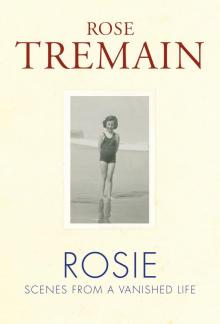 Rosie
Rosie The Garden of the Villa Mollini
The Garden of the Villa Mollini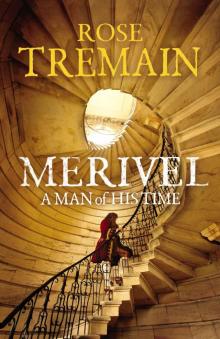 Merivel: A Man of His Time
Merivel: A Man of His Time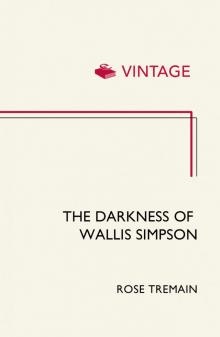 The Darkness of Wallis Simpson
The Darkness of Wallis Simpson Earth
Earth Sacred Country
Sacred Country The Swimming Pool Season
The Swimming Pool Season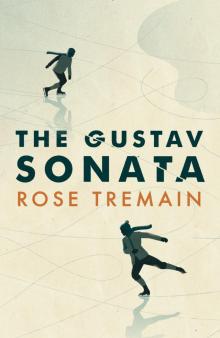 The Gustav Sonata
The Gustav Sonata Sadler's Birthday
Sadler's Birthday The Cupboard
The Cupboard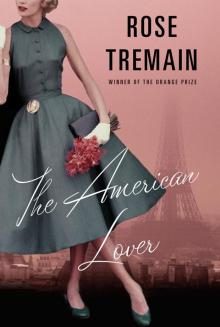 The American Lover
The American Lover Letter to Sister Benedicta
Letter to Sister Benedicta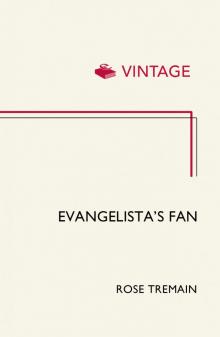 Evangelista's Fan
Evangelista's Fan Restoration
Restoration The Road Home
The Road Home The Colonel's Daughter
The Colonel's Daughter The Way I Found Her
The Way I Found Her Music & Silence
Music & Silence